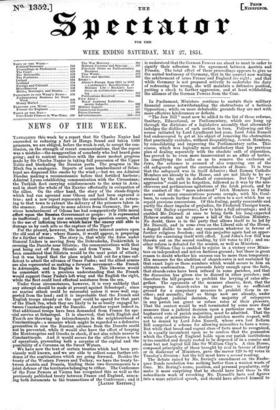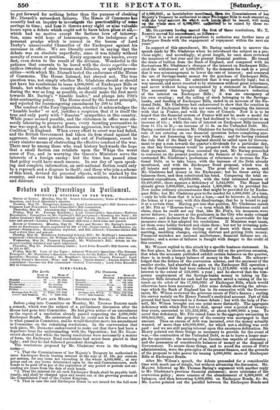In Parliament, Ministers continue to sustain their military financial course
notwithstanding the obstructions of a factious Opposition; while on more debateable grounds they are met with more effective hinderances or defeats.
"The Jew Bill" must now be added to the list of those reforms, Sanitary, Educational, or Parliamentary, which are hung up through the divisions of a legislative assembly that alternately indulges the dislikes of each section in turn. Following out the course initiated by Lord Lyndhurst last year, Lord John Russell had endeavoured to get at his object of removing the obstruction that practically excludes, without disqualifying, Jewish Members, by consolidating and improving the Parliamentary oaths. This course, which was logically more satisfactory than his previous plan of dealing separately with the obsolete oath of abjuration, has proved to be even more inconvenient as an affair of tactics. In simplifying the oaths so as to remove the exclusion of Jews, the reformer is accused of also removing one of the old safeguards against the encroachments of Rome. It is true that the safeguard was in itself delusive ; that Roman Catholic Members are already in the House, and are not likely to be re- strained by the oath in default of conscience. But the "Papal aggression" could not be forgotten, followed as it was by the mis- chievous and pertinacious agitations of the Irish priests, and by the conduct of the "more advanced" Irish Members in Parlia- ment; and many conscientious persons scruple, with Mr. Goul- burn, to concede further freedom of action to a sect which has so repaid previous concessions. Of this feeling, partly reasonable and, partly the sheer impulse of prejudice, Sir Frederick Thesiger knew, from Old Bailey experience, how to take a full advantage; and it enabled Mr. Disraeli at once to bring forth his long-expected Hebrew oration and to oppose a bill of the Coalition Ministry. No doubt, there is in the party that allows itself to be led by Mr. Disraeli, and in some even on the Liberal side of the House, a dogged dislike to make any concession whatever in favour of further religious freedom ; and this prejudice again had an oppor- tunity for exercising itself with effect. Lord John's Jew Bill was thrown out on the second reading, by 261 votes to 247; and an- other reform is defeated for the session, as well as Ministers.
Sir William Clay is enabled to rejoice in a victory over Minis- ters on independent and not on factious ground; but there is great reason to doubt whether his success can be more than temporary. His measure for the abolition of church-rates is not sustained by that exact logic or those numbers which would secure to him an ultimate confirmation. It proceeds fairly enough upon the facts, that church-rates have been refused in some parishes, and that the discussion has given rise to discord in other parishes; and therefore the bill proposes to prohibit the levying of rates alto- gether. The opponents of the measure observe, first, that the repugnance to church-rates in one place is no sufficient ground for a compulsory measure to prohibit them in an- other; and secondly, that as things now are already, under the highest judicial decision, the majority of ratepayers in any parish can grant or refuse rates at their pleasure. That the contest would be well terminated by some more final measure than a judicial decision upon a particular ease, or the
haphazard vote of parish majorities, must be admitted. That the wish even of minorities in divided parishes merits respect, will not be denied by Lord John Russell, whose own last Reform
Bill comprised a scheme for allowing minorities to have a voice.
But while that broad and cogent class of facts must be recognized, it is equally incumbent upon us to confess that the possession which the Church of England holds upon our parish institutions is too ramified and deeply rooted to be disposed of in a concise and clear but not logical bill like Sir William Clay's. A thin House, composed principally of those brought by zeal in favour of liberty or in disfavour of Ministers, gave the mover 129 to 62 votes in
Tuesday's division : but the bill must have a second reading.
The debate raised by Mr. Baring's amendment on the Exche- quer Bonds resolution was nothing better than a wanton waste of time. Mr. Baring's name, position, and personal popularity, only make it more surprising that he should have lent these to the subordinate work of reeooking Mr. Disraeli's facts and figures into a mere artistical speech, and should have allowed binuself to
be put forward for nothing better than the purpose of cloaking Mr. Disraeli's antecedent. failures- The House of Commons kas recently had an inquiry to investigate the practioabilitrof Solite savings in time ; and here it throws away eight or nine valuable hours upon a debate which ought not to have taken plat* at all,— which had no motive except the factions love of interrup- tion, some -wild hope of loanmongers, or the indulgence of a personal grudge Which is nursed in the bosom of Lord Derby's unsuccessful Chancellor of the Exchequer against his successor in office. We are literally correct in saying that the debate was an absolute superfluity, since it was totally without novelty of reason or position. Every argument was known, every fact: even down to the result of the division. Wonderful is the patience that consents to be bored with the clecies repetita—the endless iteration of stale truisms and fallacies, or spiteful person- alities—with which Mr. Disraeli tested the endurance of the House of Commons. The HOMO listened, but obeyed not. The true question was, not simply whether Mr. Gladstone should or should not have his resolutions to issue 4,000,000/. of Exchequer Bills or Bonds, but whether the country should continue to pay its way during the war as long as possible, or should make the first move towards Mr. Baring's "humble leader," and plunge into Pitt's debt-contracting policy. The House stood by the honest principle, and rejected the loanmongering amendment by 290 to 186.
The conduct of the Tory Opposition, whether it acknowledges the "humble leader" or not, justifies a suspicion that it is itself the true and only party with "Russian" sympathies in this country. While peace seemed possible, and the statesmen in office were sin- cerely labouring to preserve peace, every taunting provocative to war was urged, not to defeat Russian aggression, but to injure" the Coalition" in England. When every effort to avert war had failed, and the British Government had taken its firm stand against the aggressor, the same persons, in and out of Parliament, resort to every sinister means of obstructing the effective conduct of the war. There may be among those who read history backwards the hope that a small faction can retaliate upon the Whigs the worst error of Fox, and in worrying the Queen's Ministers serve the interests of a foreign enemy : but the time has passed since that policy could have much success. In our day of open speak- ing and complete information, an anti-national faction could only be a reproach and a disgrace to itself; and those who join a scheme of this kind, devised for personal objects, will be marked by the country, and even by their immediate connexions, for avoidance and distrust.



























